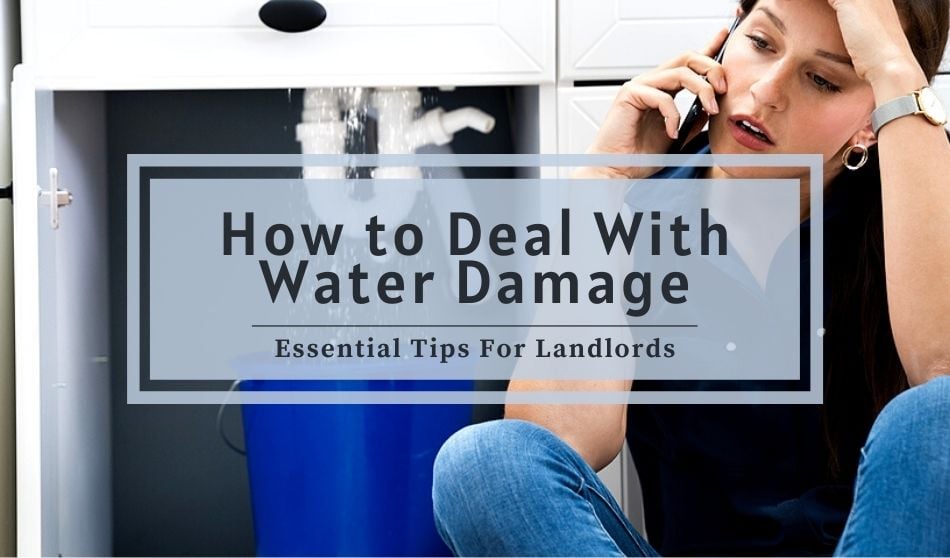There’s no denying that water damage is one of the worst nightmares for both property managers and tenants. Not only can it diminish the value of your rental property, but it can also pose severe health risks to inhabitants. Therefore, knowing how to deal with water damage is essential and could spare you more trouble later down the road.
Be Careful Who Takes Responsibility
First of all, it’s important to understand that, as a landlord, it’s your responsibility to make sure that your property is habitable and safe. Landlords are responsible for any damage that occurs due to their own negligence. As a result, you are the one that has to deal with the water damage caused by bad plumbing and pipes.
On the other hand, tenants are also responsible for their own actions that could lead to water damage. For example, if a tenant forgets to turn off the sink, then you are no longer at fault for any possible damage. In other words, your tenants will be responsible for any costs associated with repairs or will be required to repair themselves to bring the rental back to move-in conditions. Keep in mind, if you allow a tenant to make the repairs and their inexperienced job affects habitability, you could be responsible, so it may be wise to ensure that a professional addresses the issue.
Things become more complicated when the water damage has been caused by natural phenomena such as flooding. In that case, since there is no specific party to blame, the tasks can be split between tenants and landlords. More specifically, the landlord should contact a professional water damage restoration company while the tenants handle any immediate water damage. And if possible, the landlord should offer temporary accommodations to its tenants while the repairs are being made (this is a requirement in many states, so check your area’s landlord-tenant laws for guidance).
Document The Damage
More often than not, water damage is so severe that you may need to rely on your insurance to cover it. Yet, without reliable evidence, you will have a hard time proving the extent of the damage. You will likely work with a property claim adjuster; understanding your rights and the damage done is key in this instance.
When it comes to water damage, it’s important to handle the repair quickly so it doesn’t result in further damage. Regardless of the cause of the damage, you need to make sure that you document everything with pictures and videos. This is true, even if your tenant is at fault and refusing to accept responsibility for the damage. You need to address the repair, document the cost for tax deductions and security deposit deductions on the tenants’ end, and even get a plumber’s professional opinion on fault. Keep excellent documentation on any damage, discovery of cause or fault, and repairs, so you have proof if you even need it.
Educate Tenants
At the end of the day, landlords and property managers need to protect their property. As a result, you should work together with your tenants when handling active or past water damage. And while you can’t always be present to help them, you can always give your tenants some advice.
For starters, assess the situation and figure out what kind of help you can provide. If your tenants are dealing with a broken pipe or something similar, then advise them to cut off the main water supply. Tell them to remove any electrical appliances from the area to prevent electrical damage and fires. And lastly, make sure that they move furniture away from the water source to avoid damaging it.
Regular Inspections and Maintenance
Sometimes, water damage can go unseen for months before it starts wreaking havoc on your property. Not only that, but some tenants will notice issues and avoid telling their landlords about water damage right away. Therefore, you should plan routine maintenance and inspections of your property’s interior and exterior. That way, you will be able to notice any water intrusions or broken pipes and prevent further water damage.
Cleaning Up After Water Damage
As previously mentioned, water damage responsibility falls on either you or your tenants. Nevertheless, you need to ensure that your property gets repaired, no matter whose fault it is. First, contact your insurance company and check their policy for water damage. With a bit of luck, you may be able to recover at least half of the money needed to do the necessary repairs.
Once that’s done, you need to look up a water restoration company that can assess and handle the damage. While it’s true that you could repair some of your property by yourself, it’s always better to rely on professionals. In fact, some insurance policies only cover professional repairs, and you could end up losing money otherwise.
The Bottom Line
While water damage is extremely common, it can still have devastating effects on your property. As a result, it’s important to know how to handle everything from cleanup to restoration. And since most tenants have little experience with water damage, the heavy lifting usually falls on landlords. But with a bit of research and knowledge, you can easily educate your tenants on dealing with water damage. And hopefully, working together with them will prevent further damage and save your property and their homes.






